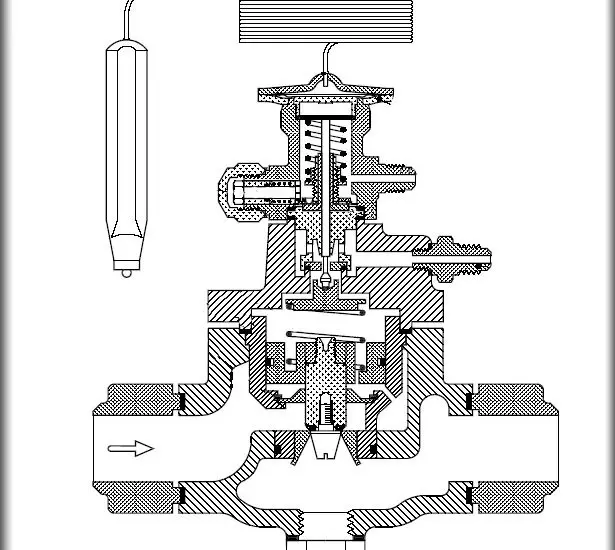In this article, we will break down everything you need to know about the expansion valve function, and why it’s crucial in refrigeration systems.

Table of Contents
Expansion Valve Function in Detail
The expansion valve, sometimes referred to as the throttling device, plays a pivotal role in the refrigeration cycle. Here’s a more detailed explanation of its primary functions:
Pressure Regulation
The refrigeration process requires the refrigerant to undergo various phase changes, and each phase change demands specific pressure conditions. The high-pressure liquid refrigerant from the condenser is not suitable for entering the evaporator directly.
The expansion valve reduces this high-pressure liquid refrigerant to a much lower pressure, suitable for the evaporator. This pressure drop causes the refrigerant to partially vaporize, creating a mixture of liquid and gas.
Temperature Control
Alongside pressure, the temperature of the refrigerant is also crucial for the cooling process. When the expansion valve reduces the pressure of the refrigerant, its temperature also decreases. This ensures that the refrigerant is cold when it enters the evaporator.
The evaporator coil absorbs heat from the surrounding environment (like the inside of a fridge or a room), which is then carried away by the refrigerant. For this heat exchange to be efficient, the refrigerant must be at the right temperature.
Flow Control
Just having the refrigerant at the right pressure and temperature is not enough. The amount or flow rate of the refrigerant entering the evaporator also plays a critical role in the efficiency of the cooling process.
The expansion valve dynamically adjusts the flow rate of the refrigerant, ensuring that the evaporator receives neither too much (which might flood it) nor too little (which might result in inefficient cooling).
Check out these other related articles…
Expansion Valve in AC: Your Comprehensive Guide
Electronic Expansion Valve: Your Easy Guide
Expansion Valve Types: Your Comprehensive Guide
Expansion Valve in Refrigerator: Your Easy 101 Guide
Expansion Valve Chiller: Your Quick 101 Guide
Why is the Expansion Valve Important in Refrigeration Systems?
The importance of the expansion valve in refrigeration systems can’t be overstated. It’s not just about controlling the flow or pressure; the expansion valve ensures the entire system works harmoniously. Here’s a deeper look:
Efficiency
Proper pressure, temperature, and flow rate regulation mean that the refrigeration system can operate at its peak efficiency. This means better cooling for lower energy consumption, which translates to savings in energy bills.
An inefficiently functioning expansion valve can cause the system to work harder, consuming more power and potentially leading to premature system wear or failure.
Protection
A refrigeration system’s compressor is designed to handle gaseous refrigerant, not liquid. The expansion valve ensures that the refrigerant entering the compressor is in its gaseous form.
If liquid refrigerant were to enter the compressor, it could lead to a phenomenon called “liquid slugging,” which can severely damage the compressor, leading to costly repairs or replacements.
Optimal Cooling
For a refrigerator or air conditioner to cool effectively, the evaporator coil must receive the refrigerant at the correct temperature, pressure, and flow rate.
By effectively controlling these parameters, the expansion valve ensures that the space or compartment being cooled reaches the desired temperature and maintains it consistently.
Speaking of refrigerators that can maintain optimal cooling, this Amazon-listed Walsh Compact Refrigerator blew us away with its R600a high-efficiency and low-energy consumption compressor that helps it cool food quickly with lower energy.
Conclusion
In summary, the expansion valve’s role in a refrigeration system is multifaceted and critical. It ensures the system’s performance, longevity, and efficiency, making it an indispensable component in the refrigeration cycle.